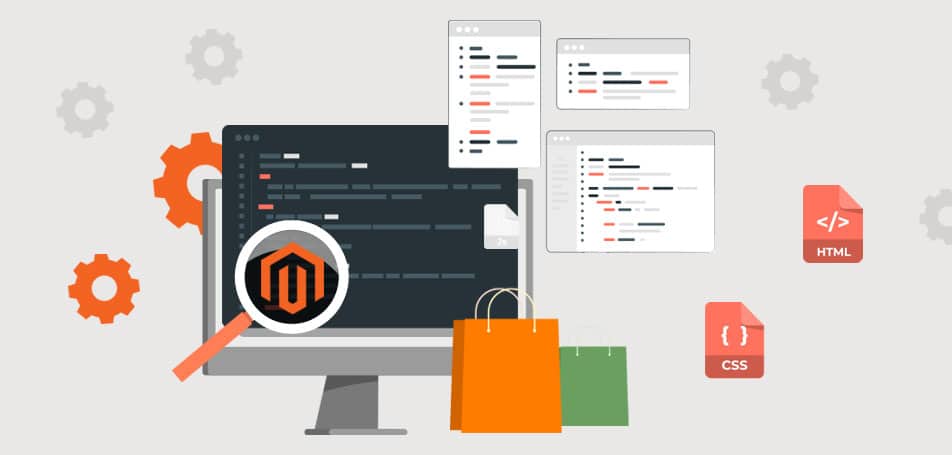
Did you know that a single glitch in your Magento store can cost you thousands in lost sales? That’s where a Magento code audit comes into play.
Now, you might be wondering, “What’s this Magento code audit all about?” Well, think of it as a health check-up, but it is for your online store. Make it a point that your Magento store doesn’t miss its code audit. After all, in the bustling world of eCommerce, staying ahead means ensuring everything runs smoothly under the hood.
However, many merchants often overlook the significance of a Magento code audit. And yes, while you might be concerned about the Magento code audit cost, consider it an investment. Because, in the long run, it can save you a lot more than you might spend.
So, whether you’re a seasoned Magento merchant or just starting out, this guide will shed light on the ins and outs of a code audit for Magento. Together, we’ll explore Magento code audit and how it can be a game-changer for your business.
Magento Code Audit: When You Need It?

Magento has emerged as a top choice for merchants globally. But, like any robust system, it requires regular check-ups, specifically a code audit. Now, you might wonder, even after being a robust platform, why it needs to be checked or why it needs a code audit.
Let’s take a friendly stroll through some common hiccups that might surprise you – and how a little code checkup can work wonders to keep your digital shop in tip-top shape.
As Magento experts, in our 10+ years of industry experience, we have found that a Magento code audit becomes necessary for Magento merchants if they face the following:
Drop in Sales
If your sales are taking a nosedive, it might not just be the market. It could be coding gremlins causing issues for your customers. Strange errors, wonky functions, or interface glitches can all be code related.
Website Crashes
Nothing is worse than a website crash! Whether its code errors, extensions gone rogue, or even the work of mischievous hackers, we can help you get back on track. Don’t panic; we’ve got your back!
Planning Big Changes
Thinking about major updates or migrations? Make sure your core code is cozy before making any moves. Even after changes, our code audit can ensure there are no hidden bugs.
Security Suspicion
Security is paramount in the digital realm. Suspicious code fragments, slow loading times, error messages, or ominous warnings could indicate a security breach.
So, if any of these issues sound familiar, don’t take any risks! Go for a Magento code audit straight away
It’s a gentle nudge from your website, letting you know it might be time for a Magento code audit. It’s like giving your digital storefront a little spa day to refresh, rejuvenate, and ensure it’s in its best shape to serve your customers.
So, if you are facing any one of the issues, it’s not time to ponder but straight away go for a Magento code audit service.
Magento Code Audit: What Is Checked?

In the realm of eCommerce, ensuring your store runs smoothly is paramount. One tool that stands out in this mission is the Magento code audit.
A Magento code audit allows a thorough examination of the codebase of a Magento store.
Why so? The reason is simple. The code audit will allow them to check for any:
- Inconsistencies
- Vulnerabilities
- Security
- Performance Issues
- Violations of standard coding formats
Once every line of the site’s code is checked, it becomes easy to pinpoint the technical issues that hinder the website from performing at its best.
Only after a thorough Magento code audit, does Magento merchants gain a proper insight into the technical aspects of their store, from core files to third-party extensions that might have some problems.
What’s Done in a Magento Code Audit?
It’s a known fact that Magento is a complicated platform since it consists of lots of code. So, in the event you plan to review your Magento site’s code, you must have sound technical knowledge.
Now, let’s look at what we usually do during a Magento code audit.
Here, we have given a concise breakdown of our audit steps:
1. Information Compilation
Before diving in, we gather essential details about your Magento site. This includes its version, the extensions in play, any third-party tie-ins, and bespoke tweaks you’ve made.
2. Diving Deep into Code Quality
Our seasoned professionals meticulously assess the code’s quality. We focus on its architecture, layout, and clarity. Plus, we’re on the lookout for security gaps, efficiency hiccups, and lurking bugs.
3. Configuration Settings Check-Up
We ensure your website’s settings are dialed in just right and bolstered against threats.
4. Third-Party Extensions Examination
Every third-party extension gets a thorough check. We’re vigilant about security risks, compatibility snags, and any drag on performance.
5. Customization Assessment
All your unique site modifications are under our lens. We verify they’re well-documented, safe, and don’t bog down your site’s speed.
6. Database Inspection
We delve into the database, scouting for security weak spots, optimization opportunities, and signs of potential data compromise.
7. Server Configuration Review
Ensuring your server’s setup is spot-on and fortified is paramount to us.
8. Comprehensive Reporting
Post-audit, we craft a detailed report. It pinpoints the challenges discovered and offers actionable remedies.
9. Solution Implementation
We don’t just identify problems; we’re hands-on in rectifying them. Collaborating with site owners, our dev team, starts to implement the recommended fixes into action.

Magento Code Audit Breakdown
| Steps | Focus Areas |
| Information Compilation | Version, Extensions, Integrations, Customizations |
| Code Quality Dive | Structure, Security, Performance, Bugs |
| Configuration Check-Up | Security & Proper Setup |
| Extensions Examination | Security, Compatibility, Performance |
| Customization Assessment | Documentation, Security, Performance |
| Database Inspection | Security, Optimization, Data Breaches |
| Server Configuration Review | Security & Proper Setup |
| Comprehensive Reporting | Issues Found & Solution Recommendations |
| Solution Implementation | Collaboration & Rectification |
Remember, our goal is to ensure your Magento site is robust, secure, and primed for optimal performance.
Now, in the next part of the blog let’s delve a bit deeper into the Magento code audit components.
Key Components of a Magento Code Audit
Let’s delve into its key components and understand its significance.
Security Assessment
At the heart of a Magento code audit is the security assessment. In today’s digital age, where cyber threats are rampant, ensuring your Magento store is fortified against potential attacks is paramount. Through a Magento code audit, experts meticulously scan the codebase, searching for any weak points that hackers might exploit.
Identifying Potential Threats and Vulnerabilities
Every eCommerce store, regardless of its size, is a potential target for cybercriminals. During a Magento code audit, professionals identify vulnerabilities ranging from SQL injections to cross-site scripting attacks. By pinpointing these threats, merchants can take proactive measures to rectify them, ensuring their store remains impervious to breaches. Remember, a single security lapse can lead to significant financial and reputational damage. Thus, a Magento code audit acts as a shield, protecting your business from potential cyber onslaughts.
Importance of Data Protection for Global Customers
In the global eCommerce landscape, merchants cater to customers from various regions, each with their own set of data protection regulations. A Magento code audit ensures that your store complies with these regulations, safeguarding customer data. Moreover, with data breaches becoming increasingly common, customers are more cautious than ever about where they shop.
By conducting regular Magento code audits, merchants can assure their global clientele that their data is in safe hands. After all, trust is the foundation of any successful eCommerce venture, and a Magento code audit helps in building and maintaining that trust.
In conclusion, the components of a Magento code audit go beyond mere technicalities. They delve into the very essence of what makes an eCommerce store successful: security, trust, and compliance. For merchants aiming to thrive in the competitive digital marketplace, a Magento code audit is not just beneficial—it’s essential.
Performance Optimization
A crucial component of a Magento code audit is performance optimization. In a world where every second counts, ensuring your website loads swiftly and operates without hitches is essential.
Through a Magento code audit, experts delve into the practical details of your site’s operations, aiming to supercharge its performance.
Analyzing Load Times, Database Calls, and Server Responses
Load times are the first impression your website makes. If a page takes too long to load, potential customers might just move on. During a Magento code audit, professionals assess how quickly your site’s pages load, identifying bottlenecks and areas for improvement.
Additionally, they examine database calls to ensure efficient data retrieval, and they scrutinize server responses to guarantee swift interactions. By optimizing these elements, a Magento code audit ensures your website operates at peak efficiency.
The Impact of Website Speed on Global User Retention
Website speed isn’t just about quick loading times; it’s directly linked to user retention. Studies have shown that even a one-second delay can lead to a significant drop in conversions. For global merchants, this is even more crucial.
Considering diverse internet speeds and devices across countries, a Magento code audit ensures your site performs optimally for everyone, everywhere. After all, a satisfied customer is more likely to return, and website speed plays a pivotal role in that satisfaction. Through a Magento code audit, merchants can ensure they cater to a global audience without compromising on speed or efficiency.
In conclusion, performance optimization, as part of a Magento code audit, is not just a technical exercise. It’s a strategic move that can significantly boost user satisfaction and, consequently, sales. For merchants looking to offer a seamless shopping experience, a Magento code audit is the key to unlocking peak website performance.
Code Quality and Integrity
In the intricate world of eCommerce, the quality and integrity of your website’s code can make or break your success. A Magento code audit is the magnifying glass that ensures your code is not just good but exceptional. Let’s explore the facets of this audit.
Ensuring Adherence to Magento Coding Standards
Magento, as a platform, has set coding standards to ensure uniformity and efficiency. During a Magento code audit, experts meticulously check if your store’s code aligns with these standards. By adhering to them, merchants ensure smoother upgrades, better compatibility with extensions, and overall improved site performance. Every Magento code audit places a strong emphasis on these standards, ensuring your store remains in top shape.
The Risks of Modified Core A Files and the Benefits of Modular Coding
Modifying core files might seem like a quick fix, but it’s a risky move. Through a Magento code audit, such modifications are identified, and merchants are alerted to potential issues. Modified core files can lead to upgrade challenges, extension conflicts, and even security vulnerabilities.
On the other hand, modular coding, where customizations are made without altering core files, offers flexibility and stability. A Magento code audit champions this approach, guiding merchants toward best coding practices.
Database Analysis
In the digital marketplace, the backbone of any eCommerce store is its database. A Magento code audit ensures this backbone is robust and ready to support global traffic. Let’s dive deeper into the world of database analysis.
Importance of Efficient Database Structures for Handling Global Traffic
A store’s database is its treasure trove, storing everything from product details to customer information. For global stores, this database faces the challenge of catering to users from different regions simultaneously. An efficient database structure, as highlighted in a Magento code audit, ensures quick data retrieval, even during peak traffic times.
Imagine thousands of users accessing your store during a sale; without an optimized database, the site could slow down or even crash. Through a Magento code audit, merchants gain insights into their database’s efficiency, ensuring it’s equipped to handle global traffic with ease.
Tips for Database Optimization
Database optimization is not just about size but about structure and queries. During a Magento code audit, experts provide valuable tips for optimization. Some of these include cleaning up old logs, optimizing database queries, and ensuring efficient indexing.
Additionally, using caching mechanisms can drastically reduce database load, enhancing site performance. Remember, an optimized database translates to faster page loads, smoother checkouts, and an overall improved user experience.
Every Magento code audit places a strong emphasis on these optimization techniques, guiding merchants towards best practices.
In conclusion, with the right database structure and optimization techniques, merchants can ensure their store remains swift and efficient, regardless of traffic volume. For those looking to elevate their Magento store’s performance, a Magento code audit is the key.
Frontend Performance Code Audit: Do’s & Don’ts
A faster website means happier customers. And happy customers often mean more sales. So, let’s dive into the do’s and don’ts of it!
Say No to Inline and Internal CSS
Imagine you’re packing for a trip. Instead of stuffing everything into one suitcase, it’s better to organize. Similarly, don’t cram all your style instructions (CSS) into one page. It makes your website heavy and slow. Keep them separate, and your website will load faster.
Keep Scripts External
Scripts are like the magic spells that make websites interactive. But, if you scribble them all over your website pages, it gets messy. Keep them in a separate magic book (external file) so they can work their charm without causing chaos.
Avoid the “Important” Trap in CSS
Using important in your style is like shouting in a library. It disrupts the natural order. Instead, be smart and specific with your style instructions. It keeps things calm and organized.
No Copy-Pasting
Repeating the same code is like telling the same story twice. It’s boring and takes up unnecessary space. Keep your code clean and unique.
Use the Right Tags and Attributes
Imagine building a house with LEGO. Using the right pieces in the right places makes your structure strong. Similarly, use the correct code pieces (tags and attributes) to make your website robust and fast.
In A Nutshell
A frontend code audit is like tidying up your room. It might seem like a chore, but once it’s done, everything works better. And for Magento 2 store owners, it means a faster website and happier customers.
Why Should Your Store Consider a Magento Code Audit?

In the bustling world of online retail, staying ahead of the curve is essential. One way to ensure your Magento store remains at the forefront is through a Magento code audit. But why is it so vital for every merchant?
Let’s dive in!
Get A Performance Boost
Ever noticed how a smooth shopping experience hinges on a website’s speed? If your site drags, it might just drag down your profits too. But don’t fret! Pinpointing these speed bumps requires a systematic approach.
Factors like frontend and backend coding, along with server components, play a role in your site’s speed.
Issues could range from misconfigured tasks to complex JavaScript issues. And guess what? Overloading with third-party plugins or poorly developed ones can slow things down too.
The trick is to thoroughly inspect these elements, spot the hiccups, and address them. Often, the culprits are poorly crafted JavaScript from third-party themes or extensions that overload the database. While ditching these extensions seems straightforward, a Magento code audit digs deeper, addressing issues like excessive website cookies, oversized website elements, and unnecessary third-party requests.
To Avoid Website Crashes
Imagine your site crashing during a sale rush! Every downtime hour might cost you big bucks and tarnish your brand’s shine. But here’s the silver lining: A well-designed error page, with links to your social media and other contact points, can cushion the blow.
Still, if customers jump ship to competitors, sales might sink. Crashes can stem from outdated software, hardware limitations, or even a compromised site. While some fixes are DIY, others demand expert hands.
Without proper know-how, you might overspend on unnecessary server resources or stumble upon new site issues. That’s where a Magento code audit steps in, pinpointing the glitches and offering expert fixes.
For Strengthening Security
With e-stores holding heaps of personal data, they’re juicy targets for hackers. These cyber baddies constantly scout for weak spots, and once found, they swoop in, accessing user info or planting malicious code. Such breaches can spell big trouble, from compliance issues to potential legal battles.
Sometimes, the weak link could be as basic as misconfigured server permissions. And shoddy extensions? They can open doors to code breaches and data leaks.
Uplifting User Experience
Magento’s beauty lies in its flexibility, allowing sellers to jazz up their sites. Its modular design lets developers tweak without disrupting the overall flow. But piling on features shouldn’t compromise speed, a cornerstone of stellar UX/UI. So, picking and integrating extensions wisely is key. A code audit shines a light on these issues, ensuring your site runs smoothly, stays crash free, and remains secure.
To Boost SEO
Did you know performance is important for Magento’s Core Web Vital? It zeroes in on essentials like load time, user interaction, and visual stability. If you’ve been eyeing a top spot-on Google’s search results, a Magento code audit could be your game-changer. After all, factors like site speed, usability, and content quality propel you up those rankings.
Ensuring Compatibility with Global eCommerce Standards
As eCommerce becomes increasingly global, stores must adhere to various regional standards and regulations. Whether it’s GDPR (General Data Protection Regulations) compliance for European customers or specific payment gateway regulations in Asia, a Magento code audit ensures your store remains compliant.
By regularly reviewing and updating the code, merchants can avoid potential legal pitfalls and ensure a smooth shopping experience for customers, regardless of their location.
Furthermore, with new regulations emerging frequently, a Magento code audit helps merchants stay updated, avoiding penalties and ensuring uninterrupted business operations.
In conclusion, a Magento code audit isn’t just a technical exercise; it’s a strategic move. For merchants aiming to offer the best to their customers, be it in terms of performance, security, or compliance, a Magento code audit is the key.
So, if you’re looking to elevate your Magento store to new heights, consider making a Magento code audit a regular part of your business strategy.
Schedule Your Magento Code Audit Service

Do you need a code audit done for your eCommerce site? Yes! As a code audit expert, we have an excellent track record of auditing eCommerce stores, be it small and large, across all industries.
We understand that every website is different; hence, our team always takes a custom approach for each Magento code audit project.
So, right from the moment you get in touch with us, you can have complete peace of mind. We will take care of each and every aspect of the code audit, be it a theme audit or a third-party module audit.
Magento Code Audit: Why Magento Merchants Worldwide Should Care?
In the vast expanse of the digital marketplace, Magento merchants have a unique challenge: catering to a global audience. A Magento code audit is the compass that guides them in this endeavor, ensuring they meet diverse customer expectations. Let’s explore why this is crucial.
Staying Updated with International eCommerce Regulations and Standards
The world of eCommerce is not just about selling; it’s about complying. Different regions have their own set of eCommerce regulations and standards. For Magento merchants, staying updated with these is paramount.
By conducting regular audits, merchants can ensure their store aligns with international standards. In short, through a Magento code audit, merchants get a clear picture of where they stand and what changes they need to make.
Enhancing Website Accessibility and Functionality
A store might look perfect to a user in the US (United States), but what about a user in Japan or Brazil? With diverse internet speeds, devices, and browsing habits, ensuring a consistent user experience becomes challenging.
This is where a Magento code audit turns out to be extremely helpful. By analyzing website performance across different regions, merchants can identify areas of improvement. Whether it’s optimizing images for faster load times or ensuring the site is mobile-responsive, a Magento code audit provides actionable insights.
Furthermore, considering the rise of mobile commerce, ensuring the site functions seamlessly on various devices is essential. Every Magento code audit emphasizes this, guiding merchants toward global user satisfaction.
In conclusion, for Magento merchants eyeing the global market, a Magento code audit is not just beneficial; it’s essential. From compliance to user experience, it covers all bases, ensuring merchants are ready to cater to customers, no matter where they come from.
For those aiming to make a mark in international eCommerce, a Magento code audit is the first step towards success.
Tips for a Successful Magento Code Audit

Navigating the eCommerce world with Magento can be thrilling, but like any journey, it requires regular check-ups. A Magento code audit is an essential pit stop, ensuring your store runs smoothly. Let’s dive into some tips for a successful audit.
Regularly Scheduling Audits
Just as you’d service a car regularly, your Magento store needs periodic check-ups. By scheduling regular Magento code audits, merchants can identify and rectify issues before they escalate.
Whether it’s a minor bug or a potential security vulnerability, catching it early can save time, money, and reputation. Moreover, the eCommerce landscape is ever evolving. Regular Magento code audits ensure your store stays in sync with the latest trends and technologies.
Collaborate with Certified Magento Experts
A Magento code audit is a specialized task, and who is better to conduct it than certified Magento experts? By collaborating with professionals of Wagento who know the platform inside out, merchants get accurate, actionable insights.
These experts bring a wealth of experience, having worked with diverse Magento stores worldwide. Through their expertise, a code audit becomes more than just a technical exercise; it becomes a strategic tool for growth.
Staying Updated
The digital world is dynamic, and Magento is no exception. With new versions and security patches released regularly, staying updated is crucial. During a Magento code audit, experts will check if your store runs the latest version and if all security patches have been applied. This not only enhances performance but also fortifies the store against potential threats. Remember, in the realm of eCommerce, security is paramount, and a Magento code audit ensures you’re always a step ahead.
Embracing Feedback & Implementing Changes
A Magento code audit will provide feedback, some positive and some pointing towards areas of improvement. For merchants, embracing this feedback is essential. Instead of seeing it as criticism, view it as a roadmap to excellence.
Every suggestion, every change recommended in a code audit, aims to elevate your store’s performance and user experience. By implementing these changes, merchants can ensure their store remains competitive and customer friendly.
For merchants aiming for success in the competitive eCommerce world, following these tips for a successful Magento code audit is the way forward.
Our Take on Magento Code Audit

In the bustling world of eCommerce, staying ahead is the key. A Magento code audit can be your secret weapon in this race.
Your Magento store deserves the best, and a code audit ensures it gets just that. Whether you’re a budding merchant or an established giant, there’s always room for improvement.
By opting for acode audit from Wagento for your magento store, you’re choosing growth, security, and excellence.
So, why wait? Reach out to our experts today and let’s embark on this journey of optimization together. With every code audit service, we ensure that your store reaches the path toward success.
For those keen on diving deeper into the nuances of a Magento code audit, we are there to help you out. Schedule a call with our team to learn more about comprehensive code audit.
Wrapping Up
For businesses with an aim on growth, regular code audits are a game-changer, ensuring the site stays ahead of updates and potential security risks. At Wagento, we strongly advocate partnering with seasoned Magento developers for Magento code audit, guaranteeing your website operates at its peak.







